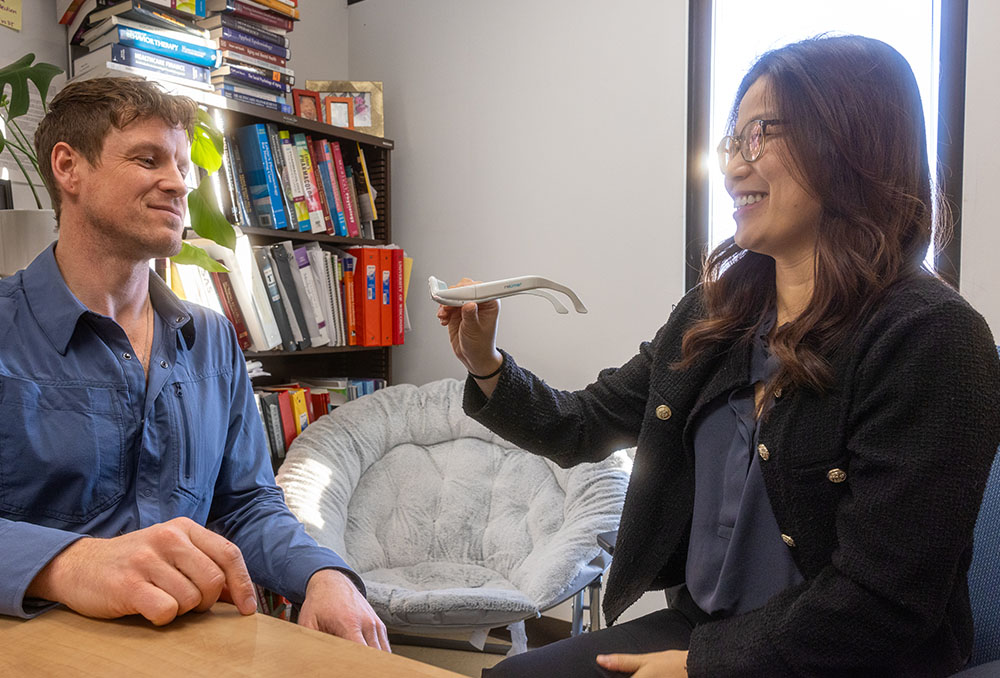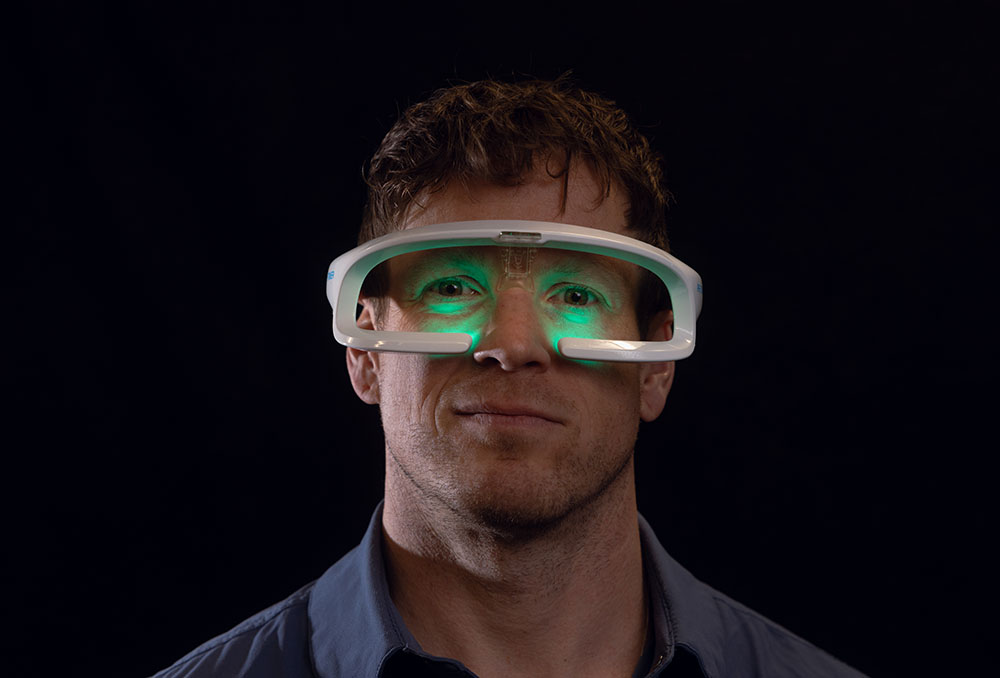Iowa Researcher Examines Morning Light's Impact on Brain Health
 PHOTO: JOHN EMIGH
Associate professor Chooza Moon demonstrates a pair of commercially available light therapy glasses.
PHOTO: JOHN EMIGH
Associate professor Chooza Moon demonstrates a pair of commercially available light therapy glasses.
Mornings are important for University of Iowa researcher Chooza Moon. In addition to getting a full night’s sleep, eating a good breakfast, and exercising, Moon aims to start each day with a healthy dose of sunlight.
“Morning-time routines really help me set up my whole day to be healthier,” says Moon, who notes that just a 15- to 30-minute walk in sunlight can be beneficial.
 PHOTO: JOHN EMIGH
Iowa nursing professor Chooza Moon studies the effectiveness of light therapy glasses on brain health.
PHOTO: JOHN EMIGH
Iowa nursing professor Chooza Moon studies the effectiveness of light therapy glasses on brain health.
An associate professor in the UI College of Nursing, Moon says light exposure is crucial for calibrating our brain’s circadian rhythms, which regulate our sleep-wake patterns and alertness. By getting outdoors or simply opening our curtains, morning light signals to our brain that it’s the start of the day, enhances wakefulness, and helps us sleep better at night. Research has also shown that morning light exposure can help improve mood and quality of life for people with a range of conditions, including seasonal affective disorder, postpartum depression, and cancer.
Moon’s research focuses on the relationship between sleep and heart disease, as well as its impact on brain health as we age, including in patients with Alzheimer’s disease and cognitive decline. Currently, Moon’s team is examining the importance of bright morning light for the sleep cycle, mood, and cognition of older adults.
In Moon’s latest study, subjects ages 55 and older wear a pair of light therapy glasses for 30 minutes daily for two weeks. As the study participants go about their morning activities, the glasses—a product called Re-Timer—deliver 500 lux of safe, UV-free light to the wearer’s retinas, mimicking the effects of sunlight. The goal, says Moon, is to determine whether these types of commercially available light therapy glasses can be beneficial for older adults, particularly those who are at the beginning stages of Alzheimer’s or with a family history of the disease.
 PHOTO: JOHN EMIGH
A UI study tests light therapy glasses to see whether they can deliver the benefits of sunlight.
PHOTO: JOHN EMIGH
A UI study tests light therapy glasses to see whether they can deliver the benefits of sunlight.
“For now, we are testing feasibility to see how it works within the general older adult population, but in the future, I would like to work with patients who could benefit from this intervention,” says Moon. “I wouldn’t say this will cure or treat anything, but it might at least help on some of those behavioral symptoms.”
In a previous study, Moon and her team studied the effectiveness of light therapy among college students to combat seasonal affective disorder, or SAD, a form of depression associated with a deficiency of natural light in late fall and winter. With research showing that college students are at a higher risk of developing SAD, which can lead to poor academic performance and other severe mental disorders, UI Student Wellness offers a program in which light boxes can be checked out.
Moon’s team surveyed more than 200 UI students who used the light boxes for an average of 45 days. The study found that 97 percent of the participants believed the light boxes—tablet-shaped lamps that mimic natural outdoor light—helped ease their SAD symptoms and improved their mood.
While Moon’s research is ongoing, she’s anecdotally found that wearing light therapy glasses can be an efficient way to get some light during her hectic mornings. “With the light boxes, you have to stay in one place rather than moving around,” she says. “But on mornings when you’re trying to get things done, this might be helpful.”
